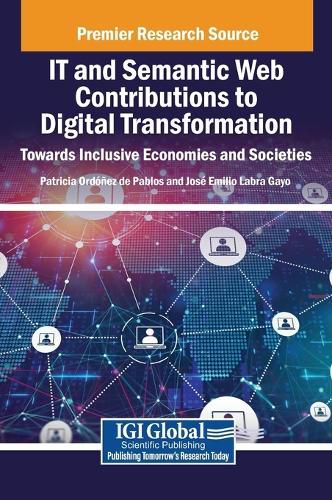Readings Newsletter
Become a Readings Member to make your shopping experience even easier.
Sign in or sign up for free!
You’re not far away from qualifying for FREE standard shipping within Australia
You’ve qualified for FREE standard shipping within Australia
The cart is loading…






This title is printed to order. This book may have been self-published. If so, we cannot guarantee the quality of the content. In the main most books will have gone through the editing process however some may not. We therefore suggest that you be aware of this before ordering this book. If in doubt check either the author or publisher’s details as we are unable to accept any returns unless they are faulty. Please contact us if you have any questions.
The rapid evolution of information technology (IT) and semantic web reshapes industries, and drives digital transformation, creating new opportunities for inclusive growth and societal progress. By enabling more efficient data sharing, intelligent decision-making, and seamless integration of digital systems, these technologies empower businesses, governments, and individuals to better navigate the complexities of today s interconnected world. The semantic web enhances understanding and accessibility of information, paving the way for inclusive economies where data-driven solutions address social inequalities and foster participation. As digital transformation continues to accelerate, IT innovations play a key role in bridging gaps, promoting economic inclusion, and supporting the creation of more equitable societies. This shift towards digital empowerment redefines how we work and live and challenges current structures that underpin modern economies and social systems. IT and Semantic Web Contributions to Digital Transformation: Towards Inclusive Economies and Societies explores how information technologies and semantic web can contribute to the successful digital transformation of companies and governments around the world. It examines state-of-the-art semantic technologies, emphasizing existing gaps in the field and identifying opportunities for value creation. This book covers topics such as policing, digital technology, and financial scams, and is a useful resource for computer engineers, business owners, IT professionals, academicians, and researchers.
$9.00 standard shipping within Australia
FREE standard shipping within Australia for orders over $100.00
Express & International shipping calculated at checkout
This title is printed to order. This book may have been self-published. If so, we cannot guarantee the quality of the content. In the main most books will have gone through the editing process however some may not. We therefore suggest that you be aware of this before ordering this book. If in doubt check either the author or publisher’s details as we are unable to accept any returns unless they are faulty. Please contact us if you have any questions.
The rapid evolution of information technology (IT) and semantic web reshapes industries, and drives digital transformation, creating new opportunities for inclusive growth and societal progress. By enabling more efficient data sharing, intelligent decision-making, and seamless integration of digital systems, these technologies empower businesses, governments, and individuals to better navigate the complexities of today s interconnected world. The semantic web enhances understanding and accessibility of information, paving the way for inclusive economies where data-driven solutions address social inequalities and foster participation. As digital transformation continues to accelerate, IT innovations play a key role in bridging gaps, promoting economic inclusion, and supporting the creation of more equitable societies. This shift towards digital empowerment redefines how we work and live and challenges current structures that underpin modern economies and social systems. IT and Semantic Web Contributions to Digital Transformation: Towards Inclusive Economies and Societies explores how information technologies and semantic web can contribute to the successful digital transformation of companies and governments around the world. It examines state-of-the-art semantic technologies, emphasizing existing gaps in the field and identifying opportunities for value creation. This book covers topics such as policing, digital technology, and financial scams, and is a useful resource for computer engineers, business owners, IT professionals, academicians, and researchers.